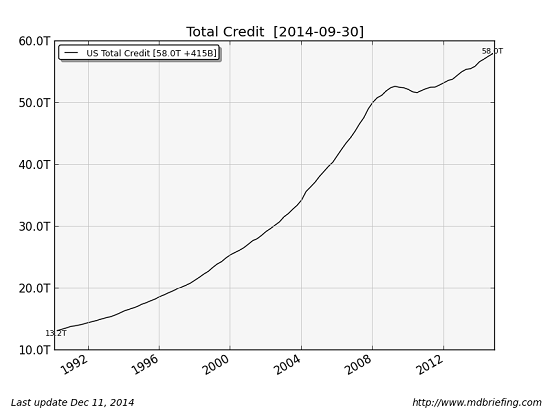By this measure, the U.S. scores very poorly: 4 out of a possible 5 on the Fragility Index.
There is a certain logic to the idea that stability is a good predictor for future stability: if a nation's economy and governance are stable and devoid of disorder, this trajectory of stability will be durable, right?
Taleb and Treverton list five sources of systemic fragility:
"For countries, fragility has five principal sources: a centralized governing system, an undiversified economy, excessive debt and leverage, a lack of political variability, and no history of surviving past shocks. Applying these criteria, the world map looks a lot different. Disorderly regimes come out as safer bets than commonly thought, and seemingly placid states turn out to be ticking time bombs."
These five factors function as a rough rating system to measure a nation's fragility.Nations with near-zero scores in all five factors are anti-fragile (i.e. durable and able to weather crises) and nations with high scores in all five are fragile, i.e. prone to instability and failure when faced with crisis.
Let's list all five sources of fragility:
1. centralized governing system
2. undiversified economy
3. excessive debt and leverage
4. lack of political variability
5. no history of surviving recent systemic shocks
How does the U.S. stack up? Let's go through the list.
1. Highly centralized power structure/governance: yes. Apologists can claim that government is decentralized via state and local governments, but this ignores the reality that virtually every policy of any importance is set in Washington by a relative handful of politicos, lobbyists and technocrats of the Deep State.
2. Undiversified economy: no. Despite the corrosive and venal dominance of the state, Wall Street/bank finance and the unproductive bubble-blowing FIRE economy (finance, insurance, real estate), the U.S. economy remains diverse.
3. Excessive debt and leverage: yes. One glance at this chart says it all:
5. No history of surviving recent systemic shocks: yes. Some will argue that the U.S. weathered the global financial meltdown of 2008-09 and so that counts as a recent shock, but I would counter that the Status Quo's "fixes" were either half-measures that rewarded the banks for their perfidy or fake reforms that added costs and rewarded vested interests, i.e. were actually counter-productive: financial "reform," ObamaCare, etc.
All the Status Quo did to resolve the crisis was print $4 trillion in new Federal Reserve money, borrow $8 trillion in U.S. Treasury bonds and offer guarantees of $23 trillion to banks that should have been liquidated. Absolutely no real structural changes were made to the Status Quo power structure of the nation.
While 9/11 was a shock, was it equivalent to Watergate or the Vietnam War or the civil rights movement? I would argue that 9/11 was not equivalent because it did not divide the nation politically or challenge it economically.
From this perspective, it could be argued that the U.S. has not had a systemic political or economic crisis for 40 years. That is not recent; it's two generations ago.
Printing and borrowing trillions of dollars does not qualify as weathering a crisis. Clicking a few keys to create or borrow trillions only papers over the systemic issues that were the sources of the instability.
By this measure, the U.S. scores very poorly: 4 out of a possible 5 on the Fragility Index. The stability we see now does not guarantee stability in the future; rather, it presages disorder and instability as the "just borrow/print another couple trillion" fixes fail to repair the systemic rot.
Duct-taping a failing Status Quo together with borrowed trillions is not anti-fragility.
Get a Job, Build a Real Career and Defy a Bewildering Economy(Kindle, $9.95)(print, $20)

Are you like me? Ever since my first summer job decades ago, I've been chasing financial security. Not win-the-lottery, Bill Gates riches (although it would be nice!), but simply a feeling of financial control. I want my financial worries to if not disappear at least be manageable and comprehensible. And like most of you, the way I've moved toward my goal has always hinged not just on having a job but a career.
You don't have to be a financial blogger to know that "having a job" and "having a career" do not mean the same thing today as they did when I first started swinging a hammer for a paycheck.
Even the basic concept "getting a job" has changed so radically that jobs--getting and keeping them, and the perceived lack of them--is the number one financial topic among friends, family and for that matter, complete strangers.
So I sat down and wrote this book: Get a Job, Build a Real Career and Defy a Bewildering Economy.
It details everything I've verified about employment and the economy, and lays out an action plan to get you employed.
I am proud of this book. It is the culmination of both my practical work experiences and my financial analysis, and it is a useful, practical, and clarifying read.
Test drive the first section and see for yourself. Kindle, $9.95 print, $20
"I want to thank you for creating your book Get a Job, Build a Real Career and Defy a Bewildering Economy. It is rare to find a person with a mind like yours, who can take a holistic systems view of things without being captured by specific perspectives or agendas. Your contribution to humanity is much appreciated."
Laura Y.
Gordon Long and I discuss The New Nature of Work: Jobs, Occupations & Careers(25 minutes, YouTube)
NOTE: Contributions/subscriptions are acknowledged in the order received. Your name and email remain confidential and will not be given to any other individual, company or agency.
| Thank you, David K. ($200), for your outrageously generous contribution to this site-- I am greatly honored by your steadfast support and readership. |
|





























